 |
 |
The Candombe Rhythm
|
This page contains sample scores and audio with basic Candombe rhythm
patterns on the traditional Chico, Repique and piano drums, and rhythm
samples on drumset and bass for styles like Candombe Song and Candombe
Funk.
|
To listen
to the examples in Real Audio TM format you must have RealPlayer®.
If you do not have it installed, you can download it free of charge
from here.
The audio samples can be heard by clicking on the scores. |
 |
|
|
|
The Madera
'The Madera' (Wood) is the name for the rhythmic
'Clave' (Key) to Candombe, and it is the rhythm played by the percussionist
on the side or shell of the drum with the drumstick.
Example - Madera rhythm pattern

|
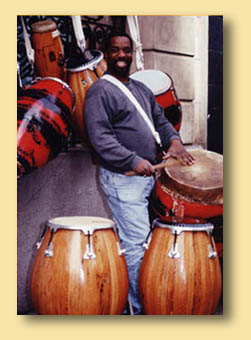 |
Chico Drum
The Chico drum gives structure to the Candombe rhythm.
It is a high pitched drum and is responsible in the drum 'Cuerda'
or ensemble for maintaining a uniform and continuous beat.
It is played by heavily striking the drumskin near the edge with
four fingers of one hand, the other hand striking with the drumstick
in the middle of the skin. |
| Example (Musical notation)
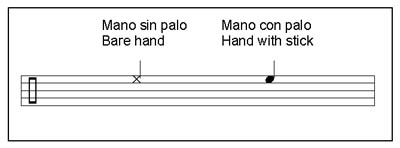
Example Chico drum rhythm pattern

|
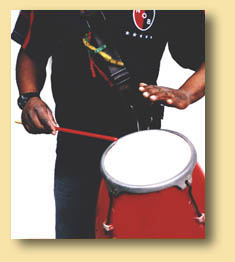 |
Piano Drum
This low-pitched drum is the foundation for the Candombe
rhythm.
The basic ways of beating this drum are: drumstick and hand striking
the drumskin in unison, producing a sound which may be accentuated,
open or muted at the drummer's discretion; and the hand alone striking
the skin. |
| Example (Musical notation)

Example Piano drum rhythm pattern

More examples |
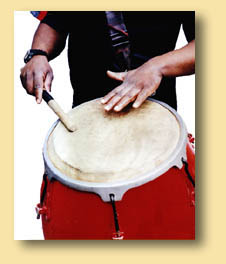 |
Repique Drum
The Repique drum improvises short and varied bursts
of rhythm, inserting them in the prevailing overall rhythm.
The Repique drum, like the other two, is played with one drumstick
and one free hand.
This drum gives out three basic sounds: one is produced by the hand
striking the drumskin loudly, another by the drumstick striking
the drumskin and the third by the drumstick striking the shell or
the upper edge of the drum.
There is a characteristic rhythm to the Repique drumbeat. |
| Example (Musical notation)
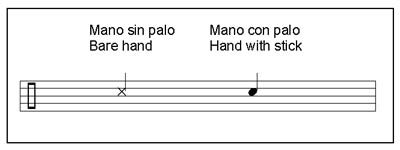
Example Repique drum rhythm pattern

|
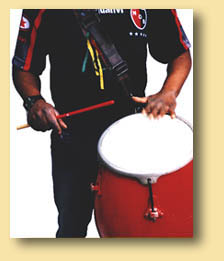 |
To hear the 'Cuerda de Tambores' (Drum Corps),
click here |
Congas / tumbadoras
In musical groups (or bands), it is common to
use tumbadoras (congas) instead of the chico, repique and piano drums.
Examples
|
|
|
|
Drumset
Back in the mid-50s, when Jazz, Rock and Roll, Bossa
Nova, etc., were developing, Uruguayan musicians began to develop
a characteristic style of music of their own, based on those new
musical trends but merged with Candombe.
Thus Candombe was no longer just a Carnival style of rhythm, but
became a part of Uruguayan music. Some memorable bands were formed
during the years that followed, The Shakers and El Kinto in the
60s, Totem in the 70s and Opa Trio in the 80s, were among the most
important.
|
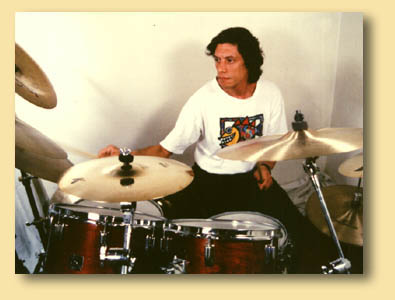 |
|
Example (Musical notation)
|
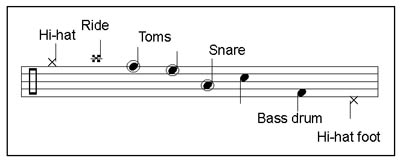 |
|
Example 1
Basic Pattern (Candombe Song)
|
 |
|
Example 2
Rhythm pattern created by Willy Muñoz, playing
the Piano Drum rhythm on the Toms.
More examples
|
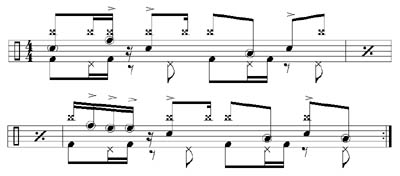 |
|
|
|
Bass
CAs mentioned earlier, during the mid-50s Candombe
began to merge with musical trends of the time, but it was towards
the end of the 60s when the genre really began to take shape in
Bass.
Specifically in Example 1 below we find a line of
Bass that can be considered basic or traditional.
|
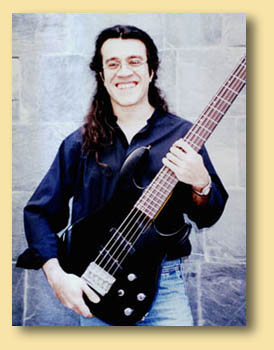 |
|
Example 1
|
 |
| Example 2 (Candombe Funk)
Here and advanced form of 'Slap' is used,
involving a combination of 'Hammer' and 'Tapping'.
More examples |
 |
|
|
|
|
"Paland"
, composed by Jorje Sadi and Willy Muñoz.
To hear the "Paland", click
here
|
|
|
|

